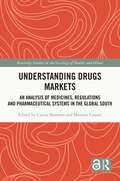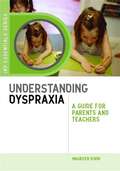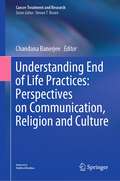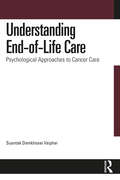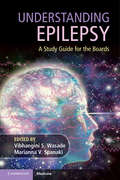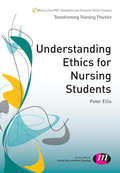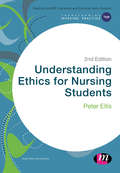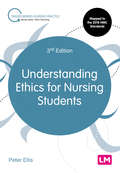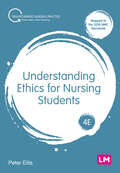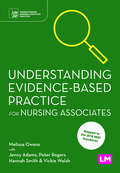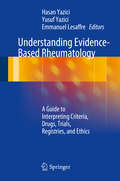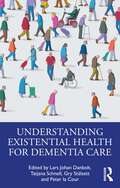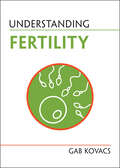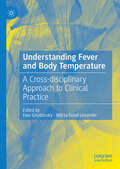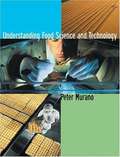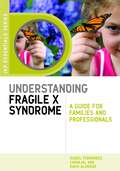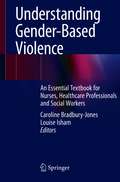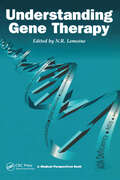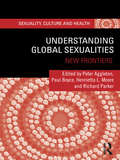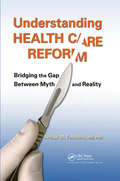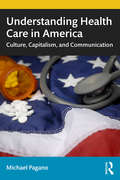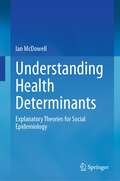- Table View
- List View
Understanding Drugs Markets: An Analysis of Medicines, Regulations and Pharmaceutical Systems in the Global South
by Carine BaxerresDrawing on anthropology, historical sociology and social-epidemiology, this multidisciplinary book investigates how pharmaceuticals are produced, distributed, prescribed, (and) consumed, and regulated in order to construct a comprehensive understanding of the issues that drive (medicine) pharmaceutical markets in the Global South today. Based on primary research conducted in Benin and Ghana, and additional data collected in Cambodia and the Ivory Coast, this volume uses artemisinin-based combination therapies (ACTs) against malaria as a central case study. It highlights the influence of the countries colonial and post-colonial history on their models for state regulation, production, and distribution, explores the determining role transnational actors as well as industries from the North but also and increasingly from the South play in influencing local pharmaceutical markets and looks at the behaviour of health care professionals and individuals. Stepping back, the authors then unpick the pharmaceuticalization process and the multiple regulations at stake by looking at the workings of, and linkages between, (biomedical health) pharmaceutical systems, (representatives of companies) industries, actors in private distribution, and consumer practices. Providing a thorough comparative analysis of the advantages and disadvantages of different pharmaceutical systems, it is an important contribution to the literature on pharmaceutalization and the governance of medication. It is of interest to students, researchers and policy-makers interested in medical anthropology, the sociology of health and illness, global health, healthcare management and pharmacy.
Understanding Dyspraxia
by Maureen BoonThis fully-updated second edition of Helping Children with Dyspraxia has been revised to reflect current practice and developments, providing clear and positive answers to questions commonly asked by parents and teachers about dyspraxia. Maureen Boon draws on her considerable experience of working with children with movement disorders to identify the characteristics of dyspraxia, explaining assessment procedures and identifying what can be done to help. New reflections appear on concepts such as physical literacy and whether or not incidence of dyspraxia has increased, and in an overview of the characteristics and causes of the condition, a comprehensive update on how it is identified and assessed is provided. Terminology is reviewed, and the full range of therapeutic interventions that are available are outlined. New case studies and photographs are used to illustrate successful interventions in practice, and a helpful appendix with up-to-date details of useful publications, programmes, equipment and organisations is also included. Understanding Dyspraxia is a concise yet comprehensive handbook for parents and teachers. Its clear structure and practical, positive advice will make it an invaluable resource for anyone involved with a dyspraxic child.
Understanding End of Life Practices: Perspectives on Communication, Religion and Culture (Cancer Treatment and Research #187)
by Chandana BanerjeeThis book is an exploration of issues that are essential in end of life care. Understanding end of life practices across cultures and religions is important in the delivery of patient centered end of life care. This book helps clinicians and non-clinicians understand the various end of life practices in their vast patient populations, further contributing to providing empathetic and compassionate end of life care to patients. With the advent of many new options at the end of life, this book also explores the modern day approaches to end of life often sought by patients when faced with disease progression and adversity.
Understanding End-of-Life Care: Psychological Approaches to Cancer Care
by Suantak Demkhosei VaipheiThis book addresses the psychological, behavioural, emotional, and social issues that arise for cancer patients and their loved ones. It highlights how the existing stigma attached to cancer and associated mental illness constitutes major barriers to optimal psychosocial care of patients.This volume features scholarly entries designed to help clinicians review, anticipate, and respond to emotional issues that often arise in the context of treating cancer patients. Numerous cross-references and succinct tables and figures make it easy to use even for non-medical practitioners. It assists care providers in meeting challenges through the latest findings from wider Indian perspectives of psychological and social issues related to cancer. The relevance of psycho-oncology at different stages of disease (during treatment, rehabilitation, and palliative end-of-life care), along with various psycho-oncological intervention methods, are also illustrated.This book will be useful to students, researchers, and teachers from the fields of Oncology, Clinical Psychology, Medical Sciences, Sociology, Social Work, Psychiatry, Pathology, Bioethics, Palliative Care, Rehabilitation Medicine Anthropology, Biology, Law, and Religious Studies. It would also help in quality decision-making, pain symptom management, bereavement, and practical strategies in addressing psychological needs of cancer patients and their families, offered in an easy-to-use, quick reference format for general readers.
Understanding Epilepsy: A Study Guide for the Boards
by Vibhangini S. Wasade Marianna V. SpanakiWritten by experts in the field, this book offers an up-to-date and systematic approach to understanding epilepsy. It focuses on advanced tools and therapies in diagnosis and management, and comprehensively yet simply covers the content of the American Board of Psychiatry and Neurology certification. Five sections comprise the main text: mechanisms, classification, EEG technical concepts, diagnostic tools, and management. Pathophysiology and pathology of epilepsies are covered, as well as classification of seizures and epilepsies, electro-clinical syndromes, non-epileptic spells, and status epilepticus. Contributors also discuss diagnostic tools such as scalp and intracranial EEG, neuroimaging, and neuropsychological tests, in addition to the management of epilepsy and associated concerns, including anti-seizure drugs, surgical and stimulation therapies, gender issues, comorbidities, and psychosocial aspects. Tables, high-quality pathology, radiology and clinical images, and EEG illustrations aid readers in understanding content. A valuable book for medical trainees, neurologists, neurosurgeons, nurses and EEG technologists, and essential certification preparation.
Understanding Ethics for Nursing Students
by Peter EllisEthics is at the heart of nursing practice and an understanding of it and what it means for nursing is essential from early in the career of any nurse. However, ethical concepts can be hard to grasp for those new to the subject. This book explains ethical ideas in easy to understand terms and relates ethics to day-to-day nursing situations to help readers apply principles to their practice. The book also challenges readers to consider their own values and where ethics fits into who they are and how they behave. Key features include: - an introductory guide to ethics to help students and those new to the subject understand how it applies to nursing - the linking of each chapter to the latest NMC standards relating to ethical issues - case studies and scenarios that show how to resolve real ethical dilemmas - activities throughout to challenge readers to apply what they have learnt to their own practice.
Understanding Ethics for Nursing Students (Transforming Nursing Practice Series)
by Peter EllisFrom the start of their nursing programme it is essential that nursing students understand the significance of ethics and how it will impact the decisions they make on a daily basis. This book explains ethical ideas, theories and concepts in simple to understand terms and focuses on day-to-day nursing situations that apply principles to practice. The book challenges the reader to consider their own values and where ethics fits into who they are and how they behave and carefully unlocks this fascinating and important subject. Key features A practical guide that explores how ethics applies to nursing and where the key theories fit in Each chapter contains real world case studies and scenarios with an emphasis on ethical decision making Activities throughout challenge the reader to reflect on their views and experiences and apply what they have learnt to their own practice Each chapter is linked to the latest NMC standards relating to ethical issues.
Understanding Ethics for Nursing Students (Transforming Nursing Practice Series)
by Peter EllisEthics have an significant impact on the decisions nurses make in their day-to-day work, so it&’s important for all student nurses to develop their understanding of ethical frameworks as preparation for future practice. In this book, the author explains ethical ideas, theories and concepts in simple to understand terms, focussing on real-life nursing situations in order to make applying these principles to practice easy. This book will make student nurses consider their own values, and how ethics fit into who they are and how they behave, helping them to unlock this interesting and complex subject. Key features: · Fully mapped to the new NMC standards of proficiency for registered nurses (2018) · A practical guide that explores how ethics applies to nursing and where theory fits in · Contains real work case studies with an emphasis on ethical decision making · Activities challenge students to reflect on their own values, experiences and prejudices and think about how ethics fits in with who they are and how they behave
Understanding Ethics for Nursing Students (Transforming Nursing Practice Series)
by Peter EllisEthics have an significant impact on the decisions nurses make in their day-to-day work, so it&’s important for all student nurses to develop their understanding of ethical frameworks as preparation for future practice. In this book, the author explains ethical ideas, theories and concepts in simple to understand terms, focussing on real-life nursing situations in order to make applying these principles to practice easy. This book will make student nurses consider their own values, and how ethics fit into who they are and how they behave, helping them to unlock this interesting and complex subject. Key features: · Fully mapped to the new NMC standards of proficiency for registered nurses (2018) · A practical guide that explores how ethics applies to nursing and where theory fits in · Contains real work case studies with an emphasis on ethical decision making · Activities challenge students to reflect on their own values, experiences and prejudices and think about how ethics fits in with who they are and how they behave
Understanding Ethics for Nursing Students (Transforming Nursing Practice Series)
by Peter EllisEthics have an significant impact on the decisions nurses make in their day-to-day work, so it’s important for all student nurses to develop their understanding of ethical frameworks as preparation for future practice. In this book, the author explains ethical ideas, theories and concepts in simple to understand terms, focussing on real-life nursing situations in order to make applying these principles to practice easy. This book will make student nurses consider their own values, and how ethics fit into who they are and how they behave, helping them to unlock this interesting and complex subject. Key features: Fully mapped to the NMC Future Nurse standards of proficiency (2018) A practical guide that explores how ethics applies to nursing and shows you how the theory fits in to the realities of practice Contains real work case studies with an emphasis on ethical decision making Activities challenge students to reflect on their own values, experiences and prejudices and to think about how ethics fits in with who they are and how they behave
Understanding Ethics for Nursing Students (Transforming Nursing Practice Series)
by Peter EllisEthics have an significant impact on the decisions nurses make in their day-to-day work, so it’s important for all student nurses to develop their understanding of ethical frameworks as preparation for future practice. In this book, the author explains ethical ideas, theories and concepts in simple to understand terms, focussing on real-life nursing situations in order to make applying these principles to practice easy. This book will make student nurses consider their own values, and how ethics fit into who they are and how they behave, helping them to unlock this interesting and complex subject. Key features: Fully mapped to the NMC Future Nurse standards of proficiency (2018) A practical guide that explores how ethics applies to nursing and shows you how the theory fits in to the realities of practice Contains real work case studies with an emphasis on ethical decision making Activities challenge students to reflect on their own values, experiences and prejudices and to think about how ethics fits in with who they are and how they behave
Understanding Evidence-Based Practice for Nursing Associates (Understanding Nursing Associate Practice)
by Jenny Adams Hannah Smith Peter Rogers Melissa Owens Vickie WelshProviding evidence-based care is fundamental to working safely and effectively as a nursing associate. This book equips you with the skills to identify, evaluate and apply evidence and research to your practice. From day-to-day procedures and decision-making, to addressing health inequalities and implementing service improvement, it develops your confidence in using evidence to underpin all aspects of your role. Key features - Fully mapped to the NMC Standards of Proficiency for Nursing Associates (2018) - Explains the principles of evidence-based practice in clear, straightforward language - Case studies and activities illustrate evidence-based practice across a range of different patient groups and care settings - Written specifically to address the unique experiences, challenges and requirements of the nursing associate role
Understanding Evidence-Based Practice for Nursing Associates (Understanding Nursing Associate Practice)
by Jenny Adams Hannah Smith Peter Rogers Melissa Owens Vickie WelshProviding evidence-based care is fundamental to working safely and effectively as a nursing associate. This book equips you with the skills to identify, evaluate and apply evidence and research to your practice. From day-to-day procedures and decision-making, to addressing health inequalities and implementing service improvement, it develops your confidence in using evidence to underpin all aspects of your role. Key features - Fully mapped to the NMC Standards of Proficiency for Nursing Associates (2018) - Explains the principles of evidence-based practice in clear, straightforward language - Case studies and activities illustrate evidence-based practice across a range of different patient groups and care settings - Written specifically to address the unique experiences, challenges and requirements of the nursing associate role
Understanding Evidence-Based Rheumatology
by Emmanuel Lesaffre Hasan Yazici Yusuf YaziciIt is imperative that health professionals caring for patients with rheumatic diseases understand how to correctly interpret evidence in their field, taking into account the merits and shortcomings of available data. Understanding Evidence-Based Rheumatology offers a practical assessment of criteria, drugs, trials, and registries and provides useful tools for successfully interpreting this data. The book introduces readers to basic analysis of trial design, statistics and application of data through no-nonsense, easy-to-follow insights. Using numerous examples, chapters outline the difficulties physicians encounter when measuring disease activity in rheumatology and offer strategies for systematically approaching these situations. Ethical issues in study design and reporting are examined and the book closes with a summary of future directions for scientific and clinical studies in rheumatology. Understanding Evidence-Based Rheumatology is an invaluable resource for trainees, clinicians and scientists, preparing them with the necessary tools to correctly gather evidence and shed light on the difficult practice of rheumatology.
Understanding Existential Health for Dementia Care
by Tatjana Schnell Lars Johan Danbolt Gry Stålsett Peter La CourUnderstanding Existential Health for Dementia Care is a groundbreaking book that describes how existential health can enrich and expand bio-psycho-social approaches to dementia care, recognizing that well-being extends beyond physical, neurological, and cognitive symptoms. This book equips professionals, clinicians, and caregivers to integrate existential dimensions into person-centered care, emphasizing the role of meaning in life and emotional connection for dealing with illness and suffering.Beginning with an introduction to the concept of existential health, the book connects this to an overall understanding of health related to dementia care. Core themes include the coincidence of suffering and meaning, fear of dementia, challenges to personhood, and multicultural perspectives. The book then provides an overview of how existential health can enhance person-centered care, addressing different types of dementia, neurological changes, emotional factors, and daily life functioning.The final section provides examples of existential support, including tools for meaningful conversations and existential exploration. The last chapter weaves together the book’s thematic threads, highlighting how past experiences contribute to present sense of meaning, identity, and connectedness in people with dementia.It is valuable reading for professionals in dementia care—nurses, psychologists, doctors, and chaplains—as well as for caregivers seeking inspiration and students in medicine, nursing, psychology, theology, and social work.
Understanding Fertility (Understanding Life)
by Gab KovacsInfertility can have devastating physical, emotional and financial effects on people affected. It is a common problem, but can be hard to talk about, and hard to understand. In this concise book, Dr Kovacs, a reproductive gynaecologist who has spent the past 40 years working with patients facing fertility problems, focuses on and unpicks key misconceptions. In his clear explanations, he covers the basic physiology of conceiving, and describes the areas that have to be explored for those who have not yet been able to conceive. Specific chapters cover the three major problem areas: lack of releasing eggs, sperm problems, and abnormalities of the female passages. Treatment options are discussed for each of these areas, including technical details and a brief readable overview of their history. The many ways of parenting which are now available are also detailed. This is a recommended read for couples wanting to conceive, their friends and families, and anyone who wants to understand fertility.
Understanding Fever and Body Temperature: A Cross-disciplinary Approach to Clinical Practice
by Ewa Grodzinsky Märta Sund LevanderThis book covers several areas, such as immunology, infectious diseases, physiology, general nursing, and medicine as well as measurement accuracy and the history of our understanding of fever. This book employs an interdisciplinary approach to exploring our concept of body temperature and specifically fever. The present volume revolves around thermometry, taking the reader on a journey from the past to the present. Yet while the emphasis is on the clinical importance of obtaining accurate, quantitative measurements of body temperature, the reader is also introduced to the most recent clinical work on the subject. This book represents a truly cross-disciplinary collaboration, using evidence-based practice to integrate physiological and immunological knowledge. The authors’ intention with this volume is to help readers gain better insight into the importance of using knowledge from different disciplines to develop an appreciation of the different aspects of body temperature. In addition, the reader will come to understand the concept of fever in a broader perspective than is traditionally adopted.
Understanding Food Science and Technology
by Peter MuranoUNDERSTANDING FOOD SCIENCE AND TECHNOLOGY is a comprehensive introductory level text that provides thorough up-to-date coverage of a broad range of topics in food science and technology. The text begins with an explanation of the interdisciplinary nature of food science (including biology, engineering, chemistry, and physics) and describes avenues of advanced study in the field. The text explores key food commodities and food composition with an emphasis on the functional properties of each commodity. <p><p> Three chapters on food chemistry cover the chemical and physical properties of foods through the use of many easy to understand figures, tables, and illustrated concepts. Next the text includes an overview of food law that provides historical perspective as well as the latest information on nutrition labeling and food regulation. Thorough coverage of processing methods in included in all major food commodities as well as a background in microbiology and fermentation, food handling and safety, food contamination, HACCP principles and toxicology. The final chapters cover food engineering concepts and applications, biotechnology and the field of sensory evaluation and food product development with coverage of marketing principles.
Understanding Fragile X Syndrome
by Isabel Fernández Carvajal David AldridgeFragile X syndrome is one of the main causes of child developmental delay and autism spectrum disorders. A premutated form of the same gene is also the basis for neurological disabilities in adults. This book breaks down the complex science of this genetic disorder and provides the facts and advice that every bewildered parent or professional needs to support individuals with Fragile X syndrome. This handbook offers a straightforward introduction that clearly explains the condition on both a scientific and practical level. With sections on diagnosis, symptoms and treatment, as well as discussions of various emotional and behavioral considerations, the book covers all aspects Fragile X syndrome, its implications, and the possibilities open to families affected by it. The book demonstrates how with the right therapies progress can be made and emphasizes how music can be used effectively to promote communication, interaction, fine motor skills and responsiveness in children with the condition. This is an essential reference tool for families of individuals with Fragile X syndrome, as well as therapists and healthcare professionals who are unfamiliar with the condition and looking to find out more.
Understanding Gender-Based Violence: An Essential Textbook for Nurses, Healthcare Professionals and Social Workers
by Caroline Bradbury-Jones Louise IshamThis edited book brings together the voices and insights of survivors, practitioners, educators and researchers working to prevent and minimise the harms of gender-based violence, with a specific focus on equipping health professionals and social workers to support victim-survivors. Practitioners can, and often do, play a critical role supporting victim-survivors of gender-based violence; however, this work has historically been carried out by those in specialist roles and there remains gaps and inconsistencies in education and training for qualifying and post-qualified professionals. This book makes a valuable contribution to addressing these gaps. It provides practitioners with a comprehensive resource on contemporary debates and research in the field of gender-based violence. To support readers’ learning, each chapter contains reflective exercises and draws clear links between research, theory and practice. The book is structured into four sections. The first section considers the ‘rise’ of gender-based violence in policy and practice, and questions to what extent this once marginalised perspective has become embedded in health and social work training and education. The second section of the book explores some of the expressions, contexts and implications of gender-based violence. Each chapter considers the role of health care professionals and social workers and invites the reader to reflect on their (potential) role in these areas. The third section of the collection focuses on one of the most common forms of gender-based violence that health and social work professionals are likely to encounter: physical, psychological, sexual and financial violence by an intimate partner, who may also be a parent. Finally, the fourth section showcases innovative responses to supporting victim-survivors and challenging systems that contribute to gender inequality. The intention of this book is to equip health care professionals and social workers with critical, practical and ethical resources to help them work with victim-survivors and, where possible, engage in transformative efforts to end the harms of gendered inequalities and violence.
Understanding Gene Therapy
by Prof Nick LemoineThis title explains what gene therapy is, how genes are delivered and how they are targeted. It discusses recent gene therapy trials, future applications and considers the ethical and safety issues surrounding gene therapy. Understanding Gene Therapy is a
Understanding Global Sexualities: New Frontiers (Sexuality, Culture and Health)
by Richard Parker Henrietta L. Moore Peter Aggleton Paul BoyceOver the course of the past thirty years, there has been an explosion of work on sexuality, both conceptually and methodologically. From a relatively limited, specialist field, the study of sexuality has expanded across a wide range of social sciences. Yet as the field has grown, it has become apparent that a number of leading edge critical issues remain. This theory-building book explores some of the areas in which there is major and continuing debate, for example, about the relationship between sexuality and gender; about the nature and status of heterosexuality; about hetero- and homo-normativity; about the influence and intersection of class, race, age and other factors in sexual trajectories, identities and lifestyles; and about how best to understand the new forms of sexuality that are emerging in both rich world and developing world contexts. With contributions from leading and new scholars and activists from across the globe, this book highlights tensions or ‘flash-points’ in contemporary debate, and offers some innovative ways forward in terms of thinking about sexuality – both theoretically and with respect to policy and programme development. An extended essay by Henrietta Moore introduces the volume, and an afterword by Jeffrey Weeks offers pointers for the future. The contributors bring together a range of experiences and a variety of disciplinary perspectives in engaging with three key themes of sexual subjectivity and global transformations, sexualities in practice, and advancing new thinking on sexuality in policy and programmatic contexts. It is of interest to students, researchers and activists in sexuality, sexual health and gender studies, especially those working from public health, sociological and anthropological perspectives.
Understanding Health Care Reform: Bridging the Gap Between Myth and Reality
by MD, PhD, FeldmanAfter nearly a year of debate, in March 2010, Congress passed and the president signed the Patient Protection and Affordable Care Act to reform the U.S. health care system. The most significant social legislation since the civil rights legislation and the creation of Medicare and Medicaid, the bill‘s passage has been met with great controversy. Pol
Understanding Health Care in America: Culture, Capitalism, and Communication
by Michael PaganoThis book examines the current state of American health care using a social science lens to focus on the interdependent, intercultural, economic, and communication aspects of access and delivery. This text explores how the cultures of health care organizations, health professions, governments, and capitalism, as well as communication, all contribute to a disease-focused, economically driven, technology-centered health care system. It seeks to understand 21st century health care from a macro-level view based on historical realizations and the current plethora of interdependent, but self-serving realities that provide few, if any, incentives for organizational collaboration and change. The fact that the most expensive health care system in the world does not provide the healthiest outcomes is a driving force in this exploration. By reflecting on American values and beliefs regarding health care from philosophical, clinical, communication, and cost perspectives, this text is designed to encourage an organizational transformation at every level, from government to providers to patients. This comprehensive survey is an important guide for those studying, or working in, health care professions, as well as health care policy and administration. It should also be of interest to any reader who seeks to better understand U.S. health care policy from social science, economic, and/or health communication perspectives.
Understanding Health Determinants: Explanatory Theories for Social Epidemiology
by Ian McDowellThis book assembles a wide range of explanatory perspectives on social inequalities in health. Everywhere in the world, those with less advantage die younger and suffer more illness than the wealthy. Decades of research have documented this reality and yet we lack a comprehensive understanding of the mechanisms through which social circumstances ultimately influence the biological processes that lead to disease. Explanations have been proposed from various disciplines – economics, psychology, behavioral science, geography, and neuroscience – and each sheds light on parts of the overall process. But very few texts assemble these insights into an overall explanatory paradigm.Through a review of concepts and theories from a wide range of disciplines, the author outlines how these may be woven together to offer a more complete picture of how social influences 'get under the skin' to affect health and disease. As well as understanding individual health, the book assembles explanations for social disparities in health. It concludes with a proposal for a set of explanatory models that cross disciplinary boundaries. Topics explored include:Social Inequalities in HealthExplanation and Causal Models for Social EpidemiologySocial and Economic Theories to Explain Patterns of DiseaseBiological Pathways Linking Social Determinants to HealthTheoretical Models of Health BehaviorWork Environment and HealthSocial Networks, Social Support and HealthPositive Influences on Health: Coping and ControlThe Relationship Between Personality and HealthUnderstanding Health Determinants: Explanatory Theories for Social Epidemiology is a textbook for graduate students in epidemiology, health sciences, health policy, and psychology, as well as social science students who are studying health. It will also be of interest to general readers, and can serve as a reference for researchers in epidemiology and the health sciences who are planning studies of the social determinants of health. The book reviews theories that could be tested in such studies.
